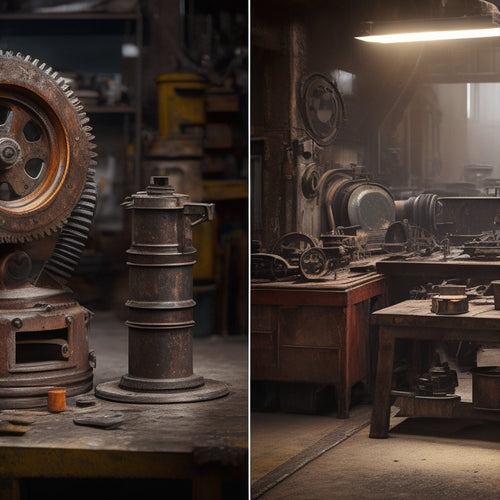
What's the Average Cost of Rooftop Solar for Your Home
Share
You're considering rooftop solar for your home, but what's the cost? On average, expect to pay between $15,000 and $20,000, depending on factors like system size, installation complexity, and local regulations. Smaller systems (2-3 kW) cost between $15,000 and $25,000, while larger systems (5-10 kW) range from $30,000 to $60,000. Costs can vary considerably based on financing options, roof condition, and other factors. To get a better understanding of the costs and benefits, consider exploring the details of rooftop solar installation to determine the best fit for your home and budget.
Key Takeaways
- The average cost of rooftop solar for your home ranges from $15,000 to $60,000, depending on system size and installation complexity.
- Rooftop solar system costs are measured in dollars per watt, with smaller systems (2-5 kW) costing $2.50 to $3.00 per watt.
- Installation costs average between $2.50 and $3.50 per watt, resulting in total costs of $15,000 to $20,000 for a typical residential system.
- Federal and state incentives can significantly reduce overall installation costs, with federal tax credits allowing claims of up to 26% of total installation costs.
- System size, quality of solar panels, and installation complexity are key factors affecting the average cost of rooftop solar for your home.
Understanding Solar Panel Costs
With solar panels becoming an increasingly popular option for homeowners, understanding the costs associated with them is vital. You need to take into account not only the upfront installation cost but also the long-term savings you'll enjoy.
A key factor in your decision-making process should be the energy savings analysis, which will help you determine how much you'll save on your energy bills over time. This analysis will also give you a clear view of your return on investment.
When it comes to financing your solar panel installation, you have several solar financing options to choose from. You can opt for a cash purchase, take out a solar loan, or investigate leasing or power purchase agreements.
Each option has its pros and cons, so it's important to evaluate them carefully before making a decision. By understanding the costs associated with solar panels and examining your financing options, you'll be well on your way to utilizing the power of the sun and reducing your reliance on traditional energy sources.
Factors Affecting Rooftop Solar Prices
Beyond the initial installation cost, several factors influence the average cost of rooftop solar, and understanding these variables is essential to making an informed decision.
You'll want to take into account your solar financing options, as they can greatly affect the overall cost. For instance, cash purchases typically offer the lowest upfront costs, while financing through loans or power purchase agreements (PPAs) may provide more flexibility but increase costs over time.
Regional price variations also play an important role. Installation costs can differ considerably depending on your location, with states like California and Massachusetts tending to be more expensive than others.
Additionally, local building codes, permits, and inspections can drive up costs in certain areas. You may also need to take into account additional expenses like roof repairs or upgrades, which can add to the overall cost.
System Size and Cost Correlation
When you're considering rooftop solar, you'll find that system size variations considerably impact installation costs.
You'll pay more per wattage for smaller systems, and costs decrease as system size increases.
However, larger systems often come with increased installation complexity, which can offset some of the economies of scale.
System Size Variations
As you traverse the intricate terrain of rooftop solar installations, one crucial aspect to grasp is the correlation between system size and cost. You'll quickly realize that a larger system doesn't always translate to more energy savings. The key is understanding your energy needs and aligning them with the right system size.
A smaller system, typically 2-3 kilowatts (kW), is ideal for households with modest energy needs, such as a small family or a home with energy-efficient appliances. These systems usually cost between $15,000 and $25,000.
On the other hand, larger systems (5-10 kW) are better suited for homes with higher energy demands, like large families or homes with multiple electric vehicles. These systems can range from $30,000 to $60,000 or more.
It's essential to assess your energy usage patterns to determine the best system size for your home. Oversizing can lead to unnecessary costs, while undersizing may not provide sufficient energy savings.
Cost per Wattage
Typically, the cost of a rooftop solar system is measured with respect to dollars per watt ($/W), which helps you understand the correlation between system size and cost. This metric provides a clear cost breakdown, allowing you to compare different systems and financing options.
When evaluating rooftop solar systems, you'll often come across prices ranging from $2.50 to $3.50 per watt. Here's what you can expect from systems in this range:
-
Smaller systems (2-5 kW): These typically cost between $2.50 and $3.00 per watt, resulting in a total cost of $5,000 to $15,000.
-
Mid-range systems (5-10 kW): Expect to pay around $2.75 to $3.25 per watt, with a total cost of $13,750 to $32,500.
-
Larger systems (10-20 kW): These usually cost between $3.00 and $3.50 per watt, resulting in a total cost of $30,000 to $70,000.
Keep in mind that these estimates are general and may vary depending on your location, installation complexity, and other factors.
Installation Complexity
Fewer than 10% of rooftop solar installations are straightforward, with most projects presenting unique challenges that drive up costs. You'll likely face installation challenges that affect your system's size and cost. These challenges can include roof suitability issues, such as complex rooflines, skylights, or multiple levels, which require more labor and materials.
| Installation Challenge | Impact on System Size | Impact on Cost |
|---|---|---|
| Complex roofline | Smaller system size | Higher cost per watt |
| Skylights or vents | Reduced system size | Higher cost per watt |
| Multiple roof levels | Larger system size | Higher total cost |
As you can see, these installation challenges can have a significant impact on your system's size and cost. For instance, a complex roofline might require a smaller system size, which can increase the cost per watt. On the other hand, multiple roof levels might allow for a larger system size, but the total cost will still be higher due to the added complexity. Understanding these challenges and their impact on your system's size and cost is essential to determining the average cost of rooftop solar for your home.
Quality of Solar Panels Matters
Your solar panel investment's success hinges on the quality of the panels themselves. You want to maximize your energy output while minimizing maintenance and environmental impact.
When evaluating solar panels, consider the following key factors:
-
Panel efficiency: Higher-efficiency panels produce more power per hour of sunlight, reducing the number of panels needed.
-
Warranty importance: A thorough warranty guarantees you're protected in case of panel failure or performance issues.
-
Brand reputation: Reputable brands invest in research and development, leading to technology advancements and improved product quality.
Additionally, look for brands with strong installation practices, maintenance considerations, and environmentally responsible manufacturing processes.
Aesthetic preferences, such as panel color and design, should also align with your home's style.
Rooftop Solar Installation Costs
Now that you've selected high-quality solar panels, it's time to reflect on the overall cost of installing a rooftop solar system. This includes the cost of labor, permits, and other necessary components.
On average, installation costs range from $2.50 to $3.50 per watt, depending on the complexity of the installation and the location of your home. For a typical residential solar system, this translates to around $15,000 to $20,000.
You'll also need to evaluate financing options, as the upfront cost of installation can be substantial. Many homeowners opt for financing through a loan or lease agreement, which can help spread the cost over time.
Additionally, you'll want to factor in maintenance costs, which are typically minimal but can add up over the system's lifespan. Regular cleaning and inspections can help guarantee peak performance and extend the life of your system.
Inverters and Mounting Hardware Expenses
You'll need to evaluate the type of inverter that's right for your rooftop solar system, as string inverters, microinverters, and power optimizers each come with different costs and benefits.
The design of your system will also impact your expenses, as a more complex layout can increase installation costs.
Additionally, the quality of your mounting hardware can affect the longevity and performance of your system, so it's crucial to balance cost with durability and reliability.
Inverter Types
Inverter types play an important role in determining the overall efficiency and cost of a rooftop solar system. As you evaluate your solar panel installation, it's vital to understand the different types of inverters available and their impact on your system's performance.
Inverters convert DC power from your solar panels into AC power for your home. The type of inverter you choose will affect your system's overall efficiency, reliability, and cost.
Here are three key inverter types to explore:
-
String Inverters: These are the most common type, suitable for most residential installations. They're cost-effective and offer high inverter efficiency (up to 98.5%).
-
Microinverters: These inverters are attached to individual solar panels, providing more flexibility and design freedom. They offer higher inverter efficiency (up to 99%) and longer lifespans (up to 30 years).
-
Power Optimizers: These systems combine the benefits of string and microinverters, offering high efficiency (up to 99%) and flexibility.
When selecting an inverter, evaluate factors like inverter efficiency, inverter lifespan, and warranty. Your choice will impact your system's overall performance, reliability, and cost.
System Design Costs
As you investigate the overall cost of your rooftop solar system, it's important to understand the expenses associated with system design, particularly when it comes to inverters and mounting hardware.
These components are critical to the system's performance and longevity, and their costs can vary greatly depending on the quality and complexity of the design.
The inverter, which converts DC power from the solar panels to AC power for your home, is a significant contributor to system design costs. A high-efficiency inverter can increase the system's overall design efficiency, but it may come at a higher cost.
Mounting hardware, including racking and tracking systems, also plays an important role in system design. The type and quality of mounting hardware can impact the system's durability and ability to withstand environmental factors.
On average, inverter and mounting hardware expenses can range from $2,000 to $4,000, depending on the size and complexity of the system.
As you consider your rooftop solar system, it's important to weigh the costs of these components against their potential benefits to guarantee the best system design and performance.
Hardware Quality Matters
The quality of your rooftop solar system's hardware can significantly impact its performance and longevity. When it comes to hardware, you get what you pay for. Investing in high-quality inverters and mounting hardware can increase your system's efficiency ratings and solar panel longevity.
Here are three key factors to evaluate when assessing hardware quality:
-
Brand reputation: Look for established brands with a proven track record of producing reliable and efficient components.
-
Warranty options: A thorough warranty can provide peace of mind and protect your investment in case hardware failures occur.
-
Installation materials and maintenance requirements: High-quality hardware often requires less maintenance and is built with durable materials that can withstand harsh weather conditions.
Permits and Inspection Fees
While preparing to install rooftop solar, you'll need to factor in permits and inspection fees, which can vary considerably depending on your location and local regulations.
These fees are typically required by your local government to guarantee that your solar panel system meets safety and building codes. The cost of permits can range from $500 to $2,000 or more, depending on the complexity of the project and the jurisdiction.
The application process usually involves submitting plans and specifications for your solar panel system, paying the required fees, and scheduling an inspection with a local building inspector.
The inspector will verify that your system is installed correctly and meets local regulations. You may also need to obtain a separate electrical permit, which can add to the overall cost.
It's essential to research the specific requirements and fees associated with your local regulations to get an accurate estimate of the total cost.
Your solar panel installer may be able to handle the permit process for you, but be certain to factor these costs into your overall budget to avoid surprises down the line.
Federal and State Incentives
You've cleared the permit and inspection hurdle, now it's time to investigate the financial benefits that come with installing rooftop solar.
The good news is that there are various federal and state incentives designed to encourage homeowners like you to switch to renewable energy.
3 Key Incentives to Evaluate:
-
Federal Tax Credits: You can claim a tax credit of up to 26% of the total cost of your rooftop solar installation. This can greatly reduce your federal tax liability, providing a substantial financial benefit.
-
State Rebate Programs: Many states offer rebate programs that provide a fixed amount per watt of solar power installed. These programs can help offset the upfront cost of installation.
-
Local Incentives: Utility partnerships, installation grants, and financing solutions are available through local governments and organizations.
These incentives can help you save even more on your energy bills and installation costs.
Average Cost of Rooftop Solar Systems
Determine your budget by understanding the average cost of rooftop solar systems, which vary depending on several factors, including system size, installation company, and local building codes.
The national average cost of a rooftop solar system is around $15,000 to $20,000. However, this cost can range from $10,000 to $30,000 or more, depending on the specifics of your project. It's important to get quotes from multiple installation companies to find the best deal for your situation.
When evaluating quotes, consider the system's wattage, panel quality, and installation warranty.
Also, factor in solar financing options, which can help spread the upfront cost over time. While the initial investment may seem steep, remember that you'll enjoy long-term savings on your electricity bills.
In fact, the average homeowner can save between $400 and $1,000 per year on their energy costs. With the right financing and installation, rooftop solar can be a smart investment for your home and your wallet.
Frequently Asked Questions
Can I Install Rooftop Solar Panels on an Old or Damaged Roof?
You'll need to assess your roof's condition before installing solar panels; if it's old or damaged, you might need to replace it to meet installation requirements, ensuring a safe and efficient energy-generating system.
Will Rooftop Solar Panels Increase My Property Taxes?
You'll want to know that rooftop solar panels can increase your property taxes, but the extent depends on your location's property tax implications; a solar panel assessment will determine the added value, which may lead to a moderate tax hike.
Do Rooftop Solar Panels Work During Power Outages?
Did you know 70% of solar panel owners prioritize outage preparedness? During power outages, your rooftop solar panels won't provide electricity unless you have a battery storage system, which allows you to capture solar energy even when the grid is down.
Can I Install Rooftop Solar Panels Myself to Save Money?
You can attempt a DIY installation to save money, but it's essential to take into account the risks and intricacies involved, as improper installation can lead to safety hazards, reduced efficiency, and voided warranties, potentially outweighing any cost savings.
Are Rooftop Solar Panels Covered Under My Homeowner's Insurance?
You're wise to wonder about insurance coverage; typically, your homeowner's policy covers rooftop solar panels, but you'll need to review your policy considerations, as some insurers require a separate endorsement or rider to guarantee adequate protection.
Related Posts
-

Why You Need a Phone Mount for Navigation
When you're on the road, a reliable phone mount is not just a convenience, it's a safety necessity that helps you mai...
-

Why Higher Upfront Costs Are Worth It
You pay a premium for high-quality, energy-efficient products, but they're worth it. With durability testing ensuring...
-

What You Need to Know About Permits and Inspections
You need to navigate the complex landscape of permits and inspections to guarantee your project complies with local z...


